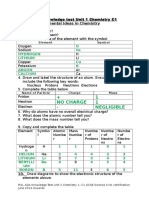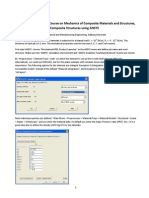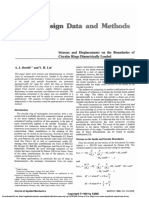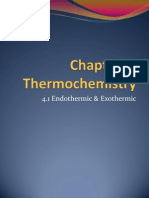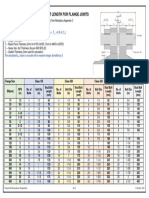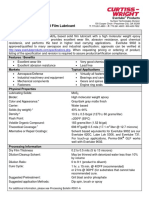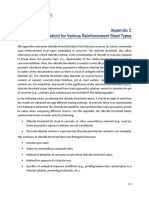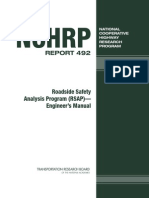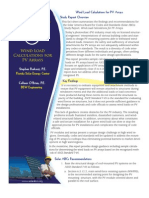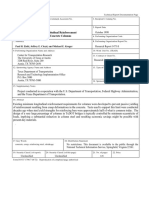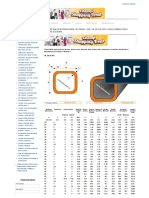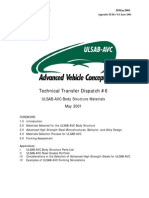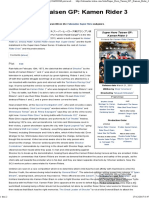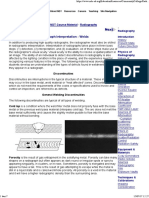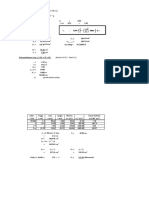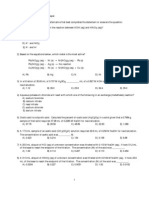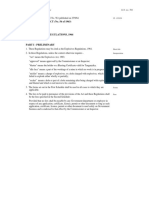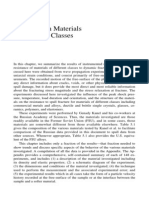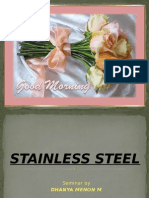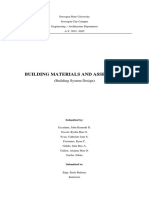Carbon Steel Grades
Carbon Steel Grades
Uploaded by
Kiky IchanafiCopyright:
Available Formats
Carbon Steel Grades
Carbon Steel Grades
Uploaded by
Kiky IchanafiOriginal Description:
Copyright
Available Formats
Share this document
Did you find this document useful?
Is this content inappropriate?
Copyright:
Available Formats
Carbon Steel Grades
Carbon Steel Grades
Uploaded by
Kiky IchanafiCopyright:
Available Formats
1018 Mild Steel Alloy 1018 is the most commonly available of the cold-rolled steels.
It is generally available in round rod, square bar, and rectangle bar. It has a good combination of all of the typical traits of steel - strength, some ductility, and comparative ease of machining. Chemically, it is very similar to A36 Hot Rolled steel, but the cold rolling process creates a better surface finish and better properties. 1018 Mild (low-carbon) steel Minimum Properties Ultimate Tensile Strength, psi Yield Strength, psi Elongation Rockwell Hardness Chemistry Iron (Fe) Carbon (C) Manganese (Mn) Phosphorus (P) Sulfur (S) 63,800 53,700 15.0% B71 98.81 - 99.26% 0.18% 0.6 - 0.9% 0.04% max 0.05% max
A36 Mild Steel ASTM A36 steel is the most commonly available of the hot-rolled steels. It is generally available in round rod, square bar, rectangle bar, as well as steel shapes such as I-Beams, H-beams, angles, and channels. The hot roll process means that the surface on this steel will be somewhat rough. Note that its yield strength is also significantly less than 1018 - this means that it will bend much more quickly than will 1018. Finally, machining this material is noticeably more difficult than 1018 steel, but the cost is usually significantly lower. ASTM A36 Mild (low-carbon) steel Minimum Properties Ultimate Tensile Strength, psi Yield Strength, psi Elongation Chemistry Iron (Fe) Carbon (C) Manganese (Mn) Copper (Cu) Phosphorus (P) Sulfur (S) 58,000 - 79,800 36,300 20.0% 99% 0.26% 0.75% 0.2% 0.04% max 0.05% max
1144 (Stressproof-equivalent) steel This material is actually pretty cool, at least for steel. It is a higher-strength alloy than 1018 or A36, but in addition has improved ductility as well. The chief feature of 1144 steel, however, is that it has very low distortion or warpage after machining due to a combination of its chemistry, method of manufacture, and heat treatment. Finally, 1144 is relatively easy to machine, with a machinability rating of 83% of AISI 1212 steel. 1144 (Stressproof-equivalent) steel Minimum Properties Ultimate Tensile Strength, psi Yield Strength, psi Elongation Rockwell Hardness Chemistry Iron (Fe) Carbon (C) Manganese (Mn) Phosphorus (P) Sulfur (S) 115,000 100,000 8.0% B95 / C17 97.54 - 98.01% 0.4 - 0.44% 1.35 - 1.65% 0.04% max 0.24 - 0.33%
12L14 free machining steel This alloy has lead added to the mix in order to enhance its machinability. In fact, it is rated with a machinability of 160% of AISI 1212 steel. The addition of lead does, however, reduce the strength of this alloy, although it is generally stronger than 1018. 12L14 free machining steel Minimum Properties Ultimate Tensile Strength, psi Yield Strength, psi Elongation Rockwell Hardness Chemistry Iron (Fe) Carbon (C) Manganese (Mn) Phosphorus (P) Lead (Pb) Sulfur (S) 78,300 60,200 10.0% B84 97.91 - 98.7% 0.15% max 0.85 - 1.15% 0.04 - 0.09% 0.15 - 0.35% 0.26 - 0.35%
A653 Galvanized Steel Galvanized steel is simply hot rolled steel to which a zinc coating has been applied for protection against corrosion. ASTM A653 Mild (low-carbon) Hot Dipped Galvanized Steel Minimum Properties Ultimate Tensile Strength, psi Yield Strength, psi Elongation Chemistry Iron (Fe) Carbon (C) Manganese (Mn) Copper (Cu) Phosphorus (P) Sulfur (S) 58,000 - 79,800 36,300 20.0% 99% 0.26% 0.75% 0.2% 0.04% max 0.05% max
A366/1008 Steel This alloy is generally used for "commercial quality" cold rolled steel sheet. It is known for its very good formability and comparatively high strength. It has a very good surface finish that is far superior to hot rolled A36. ASTM A366 (alloy 1008) steel Minimum Properties Ultimate Tensile Strength, psi Yield Strength, psi Elongation Chemistry Iron (Fe) Carbon (C) Manganese (Mn) Phosphorus (P) Copper (Cu) Sulfur (S) 43,900 - 51,900 26,100 - 34,800 42 - 48% 99% 0.08% 0.6% max 0.035% max 0.2% min 0.04%
A513 (alloy 1020-1026) Steel This alloy is generally used for DOM tubing. Its higher carbon content means higher strength, but lower weldability and machinability. ASTM A513 alloys 1020 - 1026 Mild (low-carbon) steel Minimum Properties Ultimate Tensile Strength, psi Yield Strength, psi Elongation Rockwell Hardness Chemistry Iron (Fe) Carbon (C) Manganese (Mn) Phosphorus (P) Sulfur (S) 87,000 72,000 10.0% B89 99.08 - 99.53% 0.18 - 0.23% 0.3 - 0.6% 0.04% max 0.05% max
8620 Alloy Steel This material is characterized by a hard outer surface, combined with a ductile interior for higher strength. 8620 (chrome-nickel-moly) Alloy Steel Minimum Properties Tensile Strength, psi Yield, psi Brinell Hardness Elongation Machinability Chemistry Carbon (C) Manganese (Mn) Phosphorus (P) Sulphur (S) Silicon (Si) Chromium (Cr) Nickel (Ni) Molybdenum (Mo) 97,000 57,000 201 25% 66% 0.18 - 0.23% 0.7 - 0.9% 0.35% Max 0.4% Max 0.15 - 0.35% 0.4 - 0.6% 0.4 - 0.7% 0.15 - 0.25% max
You might also like
- Pixl Knowledge Test Answers - Aqa c1 Core Science - Legacy 2016 and 2017Document16 pagesPixl Knowledge Test Answers - Aqa c1 Core Science - Legacy 2016 and 2017api-342297566No ratings yet
- The Mechanical Properties of Poly (Ether-Ether-Ketone) (PEEK) With Emphasis On The Large Compressive Strain ResponseDocument18 pagesThe Mechanical Properties of Poly (Ether-Ether-Ketone) (PEEK) With Emphasis On The Large Compressive Strain ResponseUriel PeñaNo ratings yet
- BNCSReport5 2013 11Document69 pagesBNCSReport5 2013 11AlejandroNo ratings yet
- FEM ANSYS Composites GuideDocument13 pagesFEM ANSYS Composites GuidesjqlundNo ratings yet
- ANSI Z359 Fall Protection Code Standards: Questions & Answers Regarding NewDocument2 pagesANSI Z359 Fall Protection Code Standards: Questions & Answers Regarding NewPedro Cortes CallejasNo ratings yet
- Stresses and Displacements On The Boundaries of Circular Rings Diametrically Loaded PDFDocument7 pagesStresses and Displacements On The Boundaries of Circular Rings Diametrically Loaded PDFjuanjogtr1719No ratings yet
- Short Notes Chapter 4 - Thermochemistry (Chem, F5)Document13 pagesShort Notes Chapter 4 - Thermochemistry (Chem, F5)Amira ZainudinNo ratings yet
- REPORT - NASA - 540-PG-8700.2.1B - Design of Dollies, Stands, and Spacecraft Shipping ContainersDocument12 pagesREPORT - NASA - 540-PG-8700.2.1B - Design of Dollies, Stands, and Spacecraft Shipping Containersanselm_wierciochNo ratings yet
- CBD Aisc 360 22Document99 pagesCBD Aisc 360 22JMATALLANAARENAS100% (1)
- Stud Bolt Length For UploadDocument1 pageStud Bolt Length For UploadDan PastorNo ratings yet
- NeopreneDocument145 pagesNeopreneRejoice SamboNo ratings yet
- Nato Ag-Avt-140-24Document22 pagesNato Ag-Avt-140-24marin.petre2815100% (1)
- Everlube 9002 TDSDocument2 pagesEverlube 9002 TDSValentin100% (1)
- Properties of WOOD - Page 1 To 41Document41 pagesProperties of WOOD - Page 1 To 41Jebone Stein Web Juarbal100% (1)
- 2 Concept of Limit State DesignDocument3 pages2 Concept of Limit State DesignVinoth KumarNo ratings yet
- PS-ANM-25-32 Certification of Cargo ProjectsDocument5 pagesPS-ANM-25-32 Certification of Cargo Projectsma100% (1)
- Autofrettage in Pressure VesselsDocument28 pagesAutofrettage in Pressure Vesselssran1986No ratings yet
- Chloride Threshold For Various Reinforcement Steel TypesDocument21 pagesChloride Threshold For Various Reinforcement Steel Typesshameeka100% (1)
- Fatigue AnalysisDocument31 pagesFatigue Analysissanthoshkumar.sNo ratings yet
- Standard Specification For Cast-in-Place Nonreinforced Concrete Pipe (ACI 346-90) (Reapproved 1997)Document7 pagesStandard Specification For Cast-in-Place Nonreinforced Concrete Pipe (ACI 346-90) (Reapproved 1997)nathanNo ratings yet
- Ground Engineering SystemsDocument76 pagesGround Engineering SystemsAfendi AriffNo ratings yet
- Research Note On Aluminium Alloy Property PDFDocument80 pagesResearch Note On Aluminium Alloy Property PDFpenghzNo ratings yet
- Effect of Handrail Shape On Graspability Preprint ManuscriptDocument50 pagesEffect of Handrail Shape On Graspability Preprint ManuscriptAlbertHerzogNo ratings yet
- 1.4 - Precipitation HardeningSteelDocument1 page1.4 - Precipitation HardeningSteelMuhammad Khizer KhanNo ratings yet
- Ad 2014-23-16Document9 pagesAd 2014-23-16060533No ratings yet
- PRC-8001 Rev. E - Process Specification For Dry-Film Lubricant ApplicationDocument13 pagesPRC-8001 Rev. E - Process Specification For Dry-Film Lubricant Applicationasantori6133100% (1)
- NCHRP RPT 492 PDFDocument77 pagesNCHRP RPT 492 PDFScott FergusonNo ratings yet
- 3D Impact Load Transfer MechanismDocument134 pages3D Impact Load Transfer Mechanismdafo407No ratings yet
- Extended End-Plate Stiffener PDFDocument2 pagesExtended End-Plate Stiffener PDFaams_sNo ratings yet
- BDM Example 11 - 20180101Document14 pagesBDM Example 11 - 20180101RavitejaNo ratings yet
- Ac308 - 15 - Concrete Anchor Manufacturers AssociationDocument127 pagesAc308 - 15 - Concrete Anchor Manufacturers AssociationPaulo HenriqueNo ratings yet
- ABCS-windload 1pageDocument2 pagesABCS-windload 1pagevarao1975No ratings yet
- The Charpy Impact Test and Its Applications: The Journal of Pipeline Engineering September 2013Document17 pagesThe Charpy Impact Test and Its Applications: The Journal of Pipeline Engineering September 2013Tamaduianu IoanNo ratings yet
- Aci 105Document128 pagesAci 105xfmarcoNo ratings yet
- Everlube 620 CTDSDocument2 pagesEverlube 620 CTDSchristianNo ratings yet
- Schedule 40 Pipe, Galvanized: ASTM F1043 Group I-A, Federal Specification RR-F-191 Type 1, Grade A, AASHTO M-181 Grade 1Document2 pagesSchedule 40 Pipe, Galvanized: ASTM F1043 Group I-A, Federal Specification RR-F-191 Type 1, Grade A, AASHTO M-181 Grade 1Caolboy ButchNo ratings yet
- Repair and Strengthening Methods of Flat Slabs For Punching - António M. P. Ramos, Válter J.G. Lúcio, Paul ReganDocument9 pagesRepair and Strengthening Methods of Flat Slabs For Punching - António M. P. Ramos, Válter J.G. Lúcio, Paul ReganVálter LúcioNo ratings yet
- Hmu Icc-Es Esr-3878Document10 pagesHmu Icc-Es Esr-3878Koresh KhalpariNo ratings yet
- Square Hollow Structural Sections - HSS, EN 10219 - 1997 Cold Formed Steel Square SectionsDocument3 pagesSquare Hollow Structural Sections - HSS, EN 10219 - 1997 Cold Formed Steel Square SectionsM DhafinNo ratings yet
- ASTM A686 T72301 W1A 9.5 Steel Plate, ASTM T72301 W1A 9.5 Tool SteelDocument2 pagesASTM A686 T72301 W1A 9.5 Steel Plate, ASTM T72301 W1A 9.5 Tool SteelBernice JohnsonNo ratings yet
- Wheel Hub Design DocumentationDocument4 pagesWheel Hub Design DocumentationPratikRoyNo ratings yet
- Fatigue and Static Structural Analysis of Car Wheel Using Finite Element Method - A Review-34038Document6 pagesFatigue and Static Structural Analysis of Car Wheel Using Finite Element Method - A Review-34038kiran_sridharaNo ratings yet
- Astm 666Document7 pagesAstm 666JOSEPH REFUERZONo ratings yet
- Simplified Buckling-Strength Determination of Pultruded FRP Structural BeamsDocument17 pagesSimplified Buckling-Strength Determination of Pultruded FRP Structural BeamswalaywanNo ratings yet
- Technical Transfer Dispatch #6: ULSAB-AVC Body Structure Materials May 2001Document52 pagesTechnical Transfer Dispatch #6: ULSAB-AVC Body Structure Materials May 2001Jony M. TemnikarNo ratings yet
- 05.40.00 Cold-Formed Metal Framing Specification Updated June 2015Document26 pages05.40.00 Cold-Formed Metal Framing Specification Updated June 2015mishikhanNo ratings yet
- Comparative Analysis of Crashworthiness of Empty and Foam-Filled Thin-Walled Tubes PDFDocument7 pagesComparative Analysis of Crashworthiness of Empty and Foam-Filled Thin-Walled Tubes PDFngocsanhaNo ratings yet
- Wind Loading Research ThesisDocument6 pagesWind Loading Research ThesisRamesh YadlaNo ratings yet
- Anclajes Red HeadDocument8 pagesAnclajes Red HeadLeonardo AvilaNo ratings yet
- Diaphragm: Steel DeckDocument107 pagesDiaphragm: Steel Deckrabdu100No ratings yet
- Fatigue Strength PDFDocument11 pagesFatigue Strength PDFVinayak Rao100% (1)
- 20160323110112-Sae 1215Document1 page20160323110112-Sae 1215awesome_600No ratings yet
- Simulation of Wheel Impact Test Using Nite Element MethodDocument9 pagesSimulation of Wheel Impact Test Using Nite Element MethodKemal BalabanNo ratings yet
- CISC-ICCA - Commentary S16.14 Annex KDocument20 pagesCISC-ICCA - Commentary S16.14 Annex KPatrice Audet100% (1)
- Rolling ResistanceDocument14 pagesRolling ResistanceNugrahaNo ratings yet
- Nhi 15047Document1,694 pagesNhi 15047Edilberto Tibacan Villamil100% (1)
- OsteoporosisDocument26 pagesOsteoporosisMuhamadiahNo ratings yet
- Pecco Quadshore System 2018 v2Document10 pagesPecco Quadshore System 2018 v2Divan YeungNo ratings yet
- Carbon Steel GradesDocument4 pagesCarbon Steel GradesMonique HarveyNo ratings yet
- Ss41 A36 DataDocument1 pageSs41 A36 DataHaris BangashNo ratings yet
- A36 MS SpecDocument4 pagesA36 MS SpecTan Chee MingNo ratings yet
- ASTM A36 MildLow Carbon SteelDocument2 pagesASTM A36 MildLow Carbon SteelCésar TapiaNo ratings yet
- Super Hero Taisen GP - Kamen Rider 3 - Tokupedia - FANDOM Powered by WikiaDocument1 pageSuper Hero Taisen GP - Kamen Rider 3 - Tokupedia - FANDOM Powered by WikiaKiky IchanafiNo ratings yet
- Radiograph Interpretation - WeldsDocument7 pagesRadiograph Interpretation - WeldsKiky IchanafiNo ratings yet
- Vol2 Cover PDFDocument2 pagesVol2 Cover PDFKiky IchanafiNo ratings yet
- Astm F1000Document1 pageAstm F1000Kiky IchanafiNo ratings yet
- Bulkhead Stiffener: (Section 11.B.3.1)Document1 pageBulkhead Stiffener: (Section 11.B.3.1)Kiky IchanafiNo ratings yet
- Pillar FixDocument1 pagePillar FixKiky IchanafiNo ratings yet
- Side Longitudinal: (Section 9.B.3.1) W 83.3/sDocument2 pagesSide Longitudinal: (Section 9.B.3.1) W 83.3/sKiky IchanafiNo ratings yet
- (Section 9.B.3.1) W 83.3/s: Bottom LongitudinalDocument2 pages(Section 9.B.3.1) W 83.3/s: Bottom LongitudinalKiky IchanafiNo ratings yet
- (Section 3.E.2.2 - Tabel 3.1) L L/e : W Actual Deck Long. (L 120 X 80 X 8)Document2 pages(Section 3.E.2.2 - Tabel 3.1) L L/e : W Actual Deck Long. (L 120 X 80 X 8)Kiky IchanafiNo ratings yet
- (Section 8.A.1.2) W C T e L: Bottom TransverseDocument1 page(Section 8.A.1.2) W C T e L: Bottom TransverseKiky IchanafiNo ratings yet
- Main Crankshaft Bearings - Use Oversized or Undersized BearingDocument2 pagesMain Crankshaft Bearings - Use Oversized or Undersized BearingKiky IchanafiNo ratings yet
- Hugo Chávez - Wikipedia, The Free EncyclopediaDocument1 pageHugo Chávez - Wikipedia, The Free EncyclopediaKiky IchanafiNo ratings yet
- Vetus Thruster SelectionDocument1 pageVetus Thruster SelectionKiky IchanafiNo ratings yet
- United Socialist Party of Venezuela - Wikipedia, The Free EncyclopediaDocument1 pageUnited Socialist Party of Venezuela - Wikipedia, The Free EncyclopediaKiky IchanafiNo ratings yet
- Subscene - Subtitles For The RevenantDocument8 pagesSubscene - Subtitles For The RevenantKiky IchanafiNo ratings yet
- Making A Model GhsDocument10 pagesMaking A Model GhsKiky IchanafiNo ratings yet
- Propeller ShaftDocument14 pagesPropeller ShaftKiky IchanafiNo ratings yet
- Gasket CharacteristicsDocument2 pagesGasket CharacteristicsKiky IchanafiNo ratings yet
- Forging of Specific Metals And: AlloysDocument13 pagesForging of Specific Metals And: AlloysKasia MazurNo ratings yet
- 04 QuizDocument5 pages04 QuizMani MuruganNo ratings yet
- Deacon e Phillips IVDocument24 pagesDeacon e Phillips IVFlavia CagninNo ratings yet
- B 6a Aircraft Materials and Corrosion SRDocument156 pagesB 6a Aircraft Materials and Corrosion SRSumit SamanyaNo ratings yet
- Determination of Iron and Fluoride Exp No: 5 Date AimDocument2 pagesDetermination of Iron and Fluoride Exp No: 5 Date AimkuthappadyNo ratings yet
- Paper 2 November 1999Document4 pagesPaper 2 November 1999MSHNo ratings yet
- THE EXPLOSIVES ACT (No. 56 of 1963) RegulationsDocument17 pagesTHE EXPLOSIVES ACT (No. 56 of 1963) RegulationsAUGEN AMBROSENo ratings yet
- Norguard Fall Protection and Rope AccessDocument11 pagesNorguard Fall Protection and Rope AccessnorguardNo ratings yet
- 71 The Effect of Additives On Anode Passivation in Electrorefining of CopperDocument7 pages71 The Effect of Additives On Anode Passivation in Electrorefining of CopperEugenia Araneda HernandezNo ratings yet
- Roof - Functional Purpose: BE - 1105 Building Design and Construction Lecture Note - 06Document11 pagesRoof - Functional Purpose: BE - 1105 Building Design and Construction Lecture Note - 06Ken Ingram100% (1)
- Handprint - YellowDocument17 pagesHandprint - YellowfrazNo ratings yet
- Bearing MaterialsDocument32 pagesBearing MaterialsAleš NagodeNo ratings yet
- Design For MachiningDocument47 pagesDesign For MachiningswarajNo ratings yet
- Ch5 Spall Fracture - Tarabay Antoun, Et Al.-5Document37 pagesCh5 Spall Fracture - Tarabay Antoun, Et Al.-5Muhammad Raihan BalfasNo ratings yet
- Diploma Workshop Practice IIDocument30 pagesDiploma Workshop Practice IISagir Musa SaniNo ratings yet
- Stainless SteelDocument162 pagesStainless SteelNavya AnilNo ratings yet
- Arc Welding: Prof. H. K. Khaira MSME Deptt., MANIT, BhopalDocument49 pagesArc Welding: Prof. H. K. Khaira MSME Deptt., MANIT, BhopalNordiana IdrisNo ratings yet
- Amenability of Bauxite Mine Waste From Kolli Hills, Salem, Tamil NaduDocument7 pagesAmenability of Bauxite Mine Waste From Kolli Hills, Salem, Tamil NaduravibelavadiNo ratings yet
- E Cpbcortrolos5601 enDocument3 pagesE Cpbcortrolos5601 enOsman Söke0% (1)
- Chem ProDocument4 pagesChem ProDeepak PatelNo ratings yet
- Mark Scheme Jan 1996 Unit-1Document10 pagesMark Scheme Jan 1996 Unit-1Samira MahmoodNo ratings yet
- BUILDING MATERIALS AND ASSEMBLIES (Handout) - BSCE-3BDocument24 pagesBUILDING MATERIALS AND ASSEMBLIES (Handout) - BSCE-3BArianne Mae De Vera GallonNo ratings yet
- MSDS SolventbaseDocument8 pagesMSDS SolventbaseSuresh ChNo ratings yet
- What's in A Name A Comparison of Chinese and Japanese ApproachesDocument12 pagesWhat's in A Name A Comparison of Chinese and Japanese ApproachesSrijon SadhukhanNo ratings yet
- 2023 Periodic Table (9729)Document1 page2023 Periodic Table (9729)lyddd xiaNo ratings yet
- Contoh LaporanDocument16 pagesContoh LaporanFatimah Mohd JamilNo ratings yet
- Tech 6 (Solved)Document7 pagesTech 6 (Solved)Saif Ullah100% (3)
- Corrosion Testing - ASTM StandardDocument25 pagesCorrosion Testing - ASTM StandardNandiniNo ratings yet
